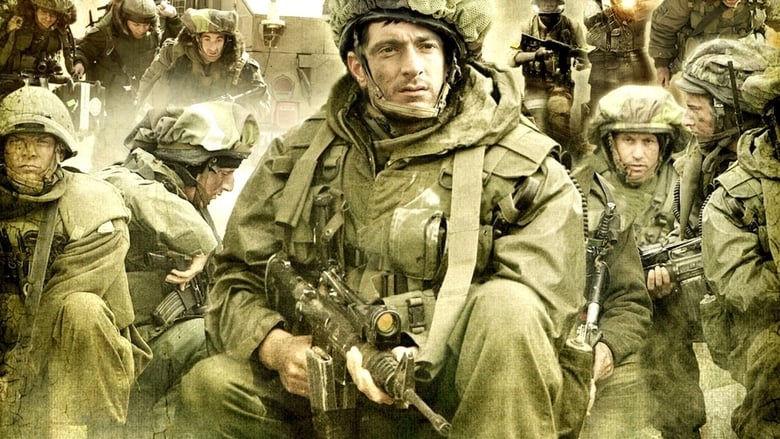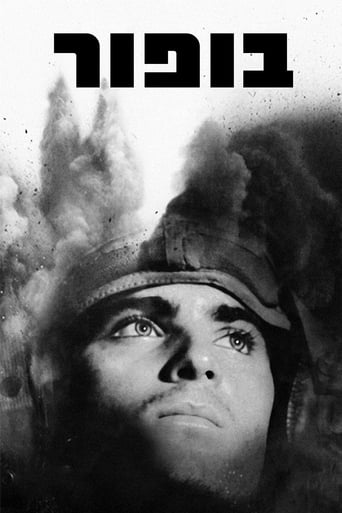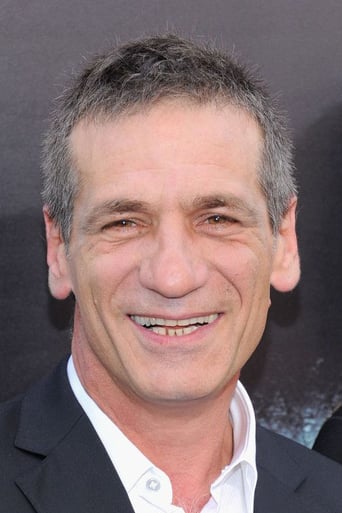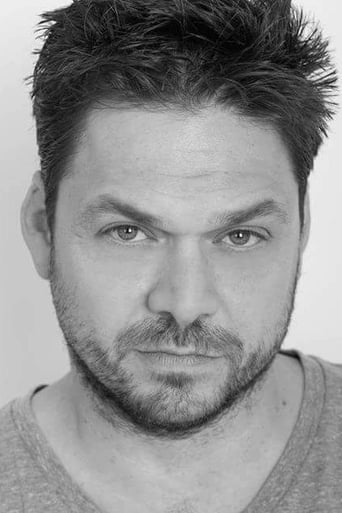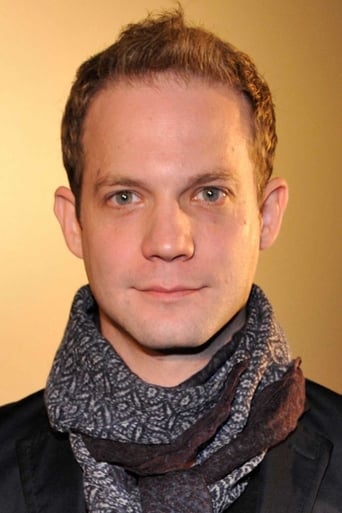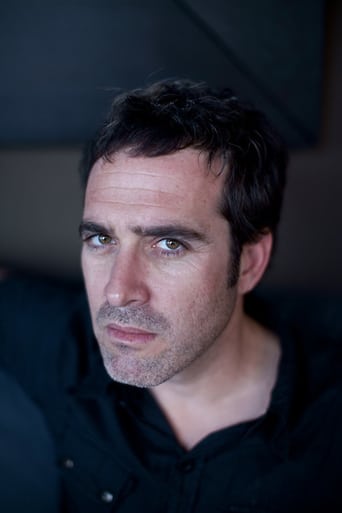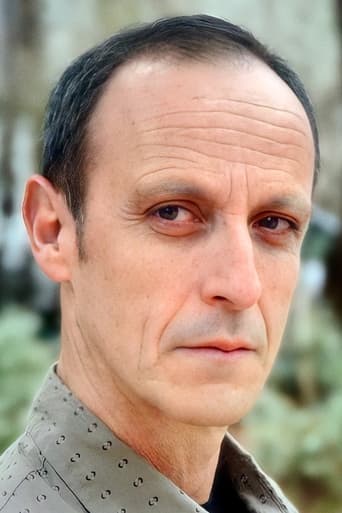BEAUFORT tells the story of LIRAZ LIBERTI, the 22 year-old outpost commander, and his troops in the months before Israel pulled out of Lebanon. This is not a story of war, but of retreat. This is a story with no enemy, only an amorphous entity that drops bombs from the skies while terrified young soldiers must find a way to carry out their mission until their very last minutes on that mountaintop.
Reviews
Must See Movie...
Just perfect...
This is a must-see and one of the best documentaries - and films - of this year.
Great example of an old-fashioned, pure-at-heart escapist event movie that doesn't pretend to be anything that it's not and has boat loads of fun being its own ludicrous self.
Though the predominant effect in Joseph Cedar's Beaufort (2007) is claustrophobic dread and futility, the film is enlivened by telling details.Two visitors frame the narrative, the soldier sent to defuse a road bomb and the soldier sent to blow-up the Beaufort bunker, to leave nothing to Hizbollah. One item that survives the explosion is the metal sheet listing the soldiers killed in the original — and apparently unnecessary — battle to win the castle. Whatever the war does it can't undo the loss of its soldiers' lives, nor their memory. The project to blow up the bunker is called Back to the Future. The dynamiter imagines a soldier returning to that landscape and pointing out, amid the revived Edenic greenery, where the old bunker and its parts once stood. But won't the land remain as scarred as the soldiers? This paradise once lost can't be regained. You can't undo a war, at least not in the individual soldier. The remote officers' disconnect from the soldiers recurs. The bomb-defuser is killed by a land mine near his target. His father on TV regrets never having taught his son fear, to preserve himself for his loving family. But the soldier knew fear. He originally resolved the bomb was too dangerous to approach. His commander overruled him, sending him to an unnecessary death. Indeed, the road is paved over anyway, so the fatal defusing attempt was unnecessary. With Hezbollah threatening to slaughter the remaining soldiers and their fort wired to explode, the remote commanders still order the battalion to remain there another night. As the loyal bomb sniffing dog is considered "a weapon," so are the soldiers reduced to impersonal weapons to the distant command.The film hints at the life these men could rather be living. When the first visitor gives a soldier some liquorice from Holland — not kid stuff but salty, strong — Cedar holds for over 10 seconds on the soldier inexpressively enjoying it. Like the white soccer ball that redundantly appears in a photo pose with the soldiers who brought the explosives, it's a reminder of the joys these men could and should be living rather than fulfilling a dubious mission beyond their country's borders. So, too, when the soldiers joke about one man's American girlfriend, another soldier appears illuminated in the doorway behind, stripped to his shorts, a fleshly image of the flesh denied. The men's bleak situation admits glimpses of the life outside. So, too, the film is drained of colour. Much is black and white, like the old American trench films of the Korean War, much in sepia, with occasional flashes of colour to remind us that these men's lives have been reduced in their palette.We don't see any enemy. We hear their missiles and see their terrible effects, but we don't see them. Nor does Cedar present any of the reasons why Israel went into Lebanon in 1982, e.g., to drive back the PLO that had been firing into Israel, the hope of working through to a peace treaty with Lebanon, etc. The enemy and the reasons for the war thus seem irrelevant. As a character stated in Time of Favour, Cedar's point is that in war one fights oneself more than an enemy. In both films the characters' alienation and misery play out amid the welcoming of the sabbath, a paradoxical discord.When our heroes finally do escape they are welcomed by troops in a row of trucks that evoke our older images of the concentration camp trains. But now the Jewish soldiers are no longer victims to the outside world — but to their own commanders. The new Jew, the Israeli Jew, is a rugged, often blond, assertive force, antithetic to the traditional shrinking victim. In the bomb sniffer the Jews run their own German shepherd.The hero, the young battalion commander, lives up to his reputation for character, virtue and judgment. By refusing to violate his instructions to remain in danger an extra night, by fulfilling his mission, he redeems himself for earlier having frozen, unable to run out to retrieve a wounded comrade. This brave leader, then, learned fear but also learned to overcome it. In the last shot he has stripped off his layers of armour and clothing and kneels in the road, weeping. He's home at last, free at last, but behind him slightly out of focus the horizon line is actually a barbed wire fence still sealing him off. This is, after all, Israel, where whatever principle you espouse, whatever ideal you advance, you're still a nation threatened with annihilation by every neighbour around — and a good many citizens within. Maybe you can't afford your ideals — but you can't afford to lose them.Like any historic fiction, Beaufort is not primarily about the time in which it is set (Israel, 2000) but about the time in which it is made (Israel, 2007). Like the best, however, it's equally effective as a reflection of the time in which the film is viewed. The wasting of the noblest lives in warfare, the fatal folly of undertaking to claim and defend outposts beyond your borders, the pathetic destructiveness of a bunker mentality — these themes still speak to audiences not just in Israel but well beyond. As in his visit to the planned attack on Temple Mount in Time of Favour and his critique of the early settlers movement in Campfire, Cedar proves Aristotle's subordination of history — which records what happened merely once — to fiction — which discovers recurrent truths everywhere and always. Wherever there is the urge to war there will be a Beaufort. And oh, what a waste of heroes. For more see www.yacowar.blogspot.com.
'Beaufort' is set during the Israeli occupation of south Lebanon, but it isn't a film about the rights and wrongs of that conflict; instead, it focuses (without external judgement) on the reality, both mundane and terrifying, of Israeli soldiers, trying to do their jobs and stay alive at the same time. Indeed, the sense of being cut off from any sense of political or military strategy is palpable, and disheartening, even within the world of the film. Its low budget means that in places it has a (probably unintentionally) stylised feel, and perhaps not quite enough happens to drive two hours of plot. But the conversations between the men are awful yet feel utterly true, while the grey and misty environment feels more like the Scottish highlands than a stereotype of Middle Eastern desert. 'Beaufort' offers no easy answers; one can even suggest it asks no easy questions; but although you'll see slicker films, its merit lies in exactly these points.
Beaufort is that rarity among war films – one with the subject matter of retreat and a (at least implied) defeat of sorts. As such it falls in with such earlier and illustrious company as Ford's They Were Expendable (1945) - a generation and continent away perhaps, but which also showed the camaraderie that can develop at the anti-climactic close of a military campaign. Unlike Ford's work, with its unspoken certainty of eventual victory, director Joseph Cedar's Beaufort is a portrait of military inertia and inevitable pointlessness, at least as experienced by its small band of combatants. Conversely it's a million miles away from such films as Black Hawk Down where it's suggested gung ho bravery can some way appease for operational ineptitude and loss. If it's true that most history is written by the victors, then Cedar's film and its ilk ought to be treasured as offering a truer and more convincing alternative - even if, as in Beaufort's case, the results are criticised by local critics for being 'left wing' and 'defeatist'.Co-adapted for the screen by its author Ron Lesham, the film concerns a group of soldiers guarding a mountaintop in Lebanon shortly before the Israeli withdrawal in 2000. Beaufort Mountain is a place with particular historical significance, both as twelfth century crusader castle and a more recent, hard-won Israeli military capture - although it's quickly apparent that the value is more symbolic than strategic. Frequently shelled by the Hezbollah, guessing perhaps that the IDF is about to pull out, the outpost is isolated, the garrison depressed, with an unclear purpose.As the film starts, Beaufort's soldiers are joined by Ziv (Ohad Knoller), sent to investigate a new-style explosive device found on the road. During the opening scenes of the film there's some anticipation in subject matter of the recent Hurt Locker, but matters shortly take a different course after the first traumatic event. It turns out that the central character of Cedar's film is not the bomb expert but the introspective and honourable Commander Liraz (Oshri Cohen). A man who "can't believe someone gave him the job", whose increasing guilt and disillusionment at his responsibilities make up the core of the narrative.It has to be said that Beaufort is rather a glum film, shot in claustrophobic interiors, often at night. This may be an accurate representation of warfare under such circumstances but although Cedar, like Ford, admirably avoids sentimentality he fails to fill the space left with any real pathos and poetry, although showing successful empathy with his characters. Neither is there much, if any, black humour to provide contrast. When not on guard duty, or dodging incoming rockets, the soldiers are normally in their bunker-like environment – the corridors of which at times remind one of a spaceship without an alien - gloomily interacting with each other. The military installation on Mount Beaufort, largely empty and of questionable purpose, becomes a symbol of their whole mission, perhaps even more so than the plaque hanging there celebrating recent war dead. The camp stands in contrast to the remains of the original castle, visited at one point by several of the soldiers while in contemplative mood: the earlier construction had a far more distinguished point and still seems to be a source of strength.Where Beaufort scores is through its representation of a soldier's life when trapped between duty and political inertia, even though it's implied withdrawal from political engagement can be seen both as a strength and weakness. Instead of confrontation, it relies upon the unspoken rage of the morally dispossessed. In one telling scene, we see Ziv watching on TV an interview with the parent of one of his fallen comrades. The commander's slow tapping with a lighter on the table, an insistent accompaniment to the points being made on the small screen (that a parent's duty is to ensure his offspring are better aware of the value of life), is like a military tattoo for a friend's funeral cortege and though him, honour itself. Ziv, the loyal soldier, cannot overtly question his predicament, but the ironic beat over coverage of events inevitably offers commentary.Writer-director Cedar's previous two films Ha-Hesador (aka: Time of Favor, 2000) and Madurat Hashevet (aka: Campfire, 2004) both engaged with social and political aspects of the modern Jewish state, sometimes with controversial elements. In this latest one he provides another well-wrought and thoughtful piece, worth seeking out, even if it does not pretend to offer any answers. But perhaps that is the point: answers are always hard to find, let alone agree on, in such circumstances.
This film is not technically a war movie, it is about soldiers at war and the effects of war on soldiers. In a way, it is the same type of movie as A WALK IN THE SUN, THE BEST YEARS OF OUR LIVES, and FULL METAL JACKET. It is not a movie about great wars, great battles or massive invasions, but one where there are long periods of inactivity punctuated with short periods of incomprehensible frenzy. The Left Elbow Index considers seven elements of film--acting, production sets, plot, character, character development, continuity, artistry, and dialogue--on a scale from a high of 10 to a low of 1, with an average movie rating a 5. It attempts to avoid emotional judgment based on the political elements of films such BEAUFORT, which like almost all Mideast films related to longstanding tensions tend to affect one's judgment of a film depending on which side of the conflict one finds oneself. The acting in this film looks reasonably good,it is measured, it is controlled, and the characters seem "real." The acting rates a 7. The production sets seem carefully constructed and authentic looking, there rating another 7. The plot seems average, a 5, with the main emphasis being on what will happen to the fort, and when. Another 5 for character development. The are some high points, but soldier's development can only go so far due to the implicit restraints of military service. Film continuity appears good, a 7, since the dramatic tone is constant. The use of high-tech equipment, the futility of war, and the eternal questions of war never leave the film. The artistry rate highest of all, an 8, due to the quality imagery and good cinematography. Also, Joseph Cedar's direction tends to focus directly on the main idea of each scene. In fact, in places, it causes the viewer to be as restless as the characters since one is unable to escape the tone of the moment. Dialogue is clever in spots, yet average overall--a 5. In a film where characters are ruled by a sense of duty, there is not much to say. The Left Elbow Index rating results in a 6.28, somewhat better than average. There are three concepts is this film which may drive you mad: duty has its price, our's not to question why, and military life amid changing orders. The film is well worth seeing, and I recommend it.
Top Streaming Movies











